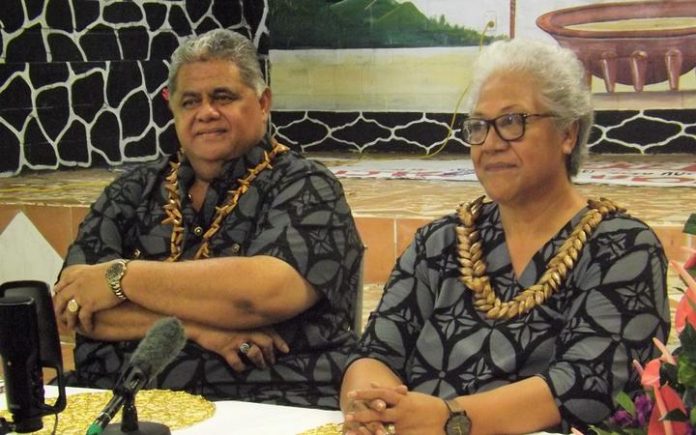Samoans could elect their first woman prime minister later this month in the rerun of an April general election that was overshadowed by controversy over the use of gender quota rules in the small Pacific island nation.
A new party led by Fiame Naomi Mata’afa, who was bidding to become Samoa’s first female premier, had been headed for a one-seat majority until electoral authorities gave the ruling party an extra lawmaker to meet a 10 percent female representation rule.
That led to a 26-seat tie between Fiame’s opposition Fa’atuatua i le Atua Samoa ua Tasi (FAST) and the long-governing Human Rights Protection Party (HRPP) of Prime Minister Tuilaepa Sailele Malielegaoi.
FAST has filed several legal appeals over the result, but in an apparent effort to overcome the controversy, the twin-island nation’s head of state said on Tuesday the election should be held again on 21 May.
The Samoa Electoral Commission did not respond to requests for a comment.
Samoa, which has a population of about 200,000, lies in a region with one of the world’s lowest levels of female political participation.
While Samoa elected its first female MP in 1970, women have always been under-represented in parliament, prompting the introduction of the gender quota law in 2013, said Kerryn Baker, a research fellow at the Australian National University.
She said it was “really unfortunate” that the 10% quota law had become mired in controversy due to the result of the April election.
“It would be incredibly ironic if a generous interpretation of this law means that Samoa’s first woman prime minister isn’t appointed,” she told the Thomson Reuters Foundation.
To run for parliament in Samoa, which lies more than 1,000 km (600 miles) north-east of Fiji, candidates must have a traditional high chief or matai title, which tends to favour men.
Currently, about 90 percent of parliamentary candidates are male, Baker said, adding that women and girls were far better represented in other parts of Samoan society such as education.
Political analysts said a potential victory for Mata’afa’s newcomer party in the election rerun would mark a sea change in Samoan politics, and could boost women’s participation in government in years to come.
“This would be a huge form of women’s empowerment, as women in Samoa would be able to visually see a female as the commander and chief of their country,” said Lefaoali’i Dion Enari, a Samoan chief and researcher at Australia’s Bond University.
Still, Jonathan Pryke, director of the Pacific islands programme at the Lowy Institute in Sydney, said the outcome of a second poll could be vastly different from the first ballot – with the ruling party likely to change tactics.
“(But) the outcome of this election, regardless of who forms government, has changed the political landscape in Samoa for good,” Pryke said.
SOURCE: REUTERS/PACNEWS














